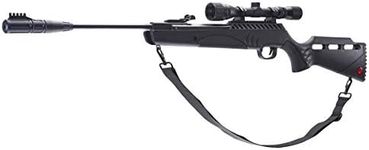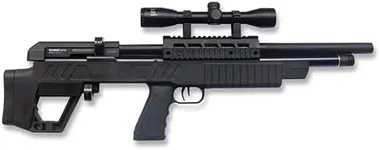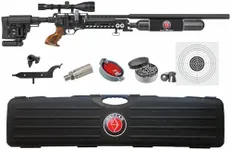Buying Guide for the Best Air Rifles
Choosing the right air rifle can be a rewarding experience, whether you're interested in target shooting, hunting, or just plinking in the backyard. The key to finding the best air rifle for you is understanding the various specifications and how they align with your needs. By focusing on the right specs, you can ensure that you get a product that meets your expectations and provides a satisfying shooting experience.CaliberCaliber refers to the diameter of the pellets that the air rifle shoots. The most common calibers are .177, .20, .22, and .25. The .177 caliber is popular for target shooting and small game hunting due to its high velocity and flat trajectory. The .22 and .25 calibers are better suited for hunting larger small game because they deliver more impact energy. Choose a caliber based on your primary use: .177 for precision and target shooting, and .22 or .25 for hunting.
Power SourceAir rifles can be powered by different mechanisms, including spring-piston, gas piston, CO2, and pre-charged pneumatic (PCP). Spring-piston and gas piston rifles are popular for their simplicity and reliability, making them great for general use and hunting. CO2 rifles offer semi-automatic firing and are good for casual shooting and plinking. PCP rifles provide high power and accuracy, ideal for serious target shooting and hunting. Consider how you plan to use the rifle and choose a power source that matches your needs.
VelocityVelocity, measured in feet per second (FPS), indicates how fast the pellet travels when fired. Higher velocity can mean better accuracy and more effective hunting. For target shooting, a velocity of 600-800 FPS is usually sufficient. For hunting, look for velocities of 800 FPS or higher to ensure enough power to humanely take down game. Match the velocity to your intended use to get the best performance.
AccuracyAccuracy is crucial for both target shooting and hunting. Factors that affect accuracy include the quality of the barrel, the consistency of the power source, and the type of pellets used. Rifles with rifled barrels tend to be more accurate. PCP rifles are generally more accurate than spring-piston or CO2 rifles due to their consistent power delivery. If precision is your priority, invest in a rifle known for its accuracy and use high-quality pellets.
WeightThe weight of the air rifle can affect your shooting experience, especially if you plan to carry it for extended periods. Lighter rifles are easier to handle and carry, making them suitable for younger shooters or those who plan to move around a lot. Heavier rifles can offer better stability and reduce recoil, which can improve accuracy. Consider your physical strength and how you plan to use the rifle when choosing the weight.
Noise LevelNoise level is an important consideration, especially if you plan to use the air rifle in a residential area or for hunting. Some air rifles are designed to be quieter, using built-in suppressors or shrouded barrels. Quieter rifles are less likely to disturb neighbors or scare away game. If noise is a concern, look for models that are specifically designed to be quiet.
Build QualityBuild quality affects the durability and longevity of the air rifle. Look for rifles made from high-quality materials like steel and hardwood, which can withstand regular use and harsh conditions. Pay attention to the fit and finish, as well as the reputation of the manufacturer. A well-built rifle will provide a better shooting experience and last longer, making it a worthwhile investment.





















